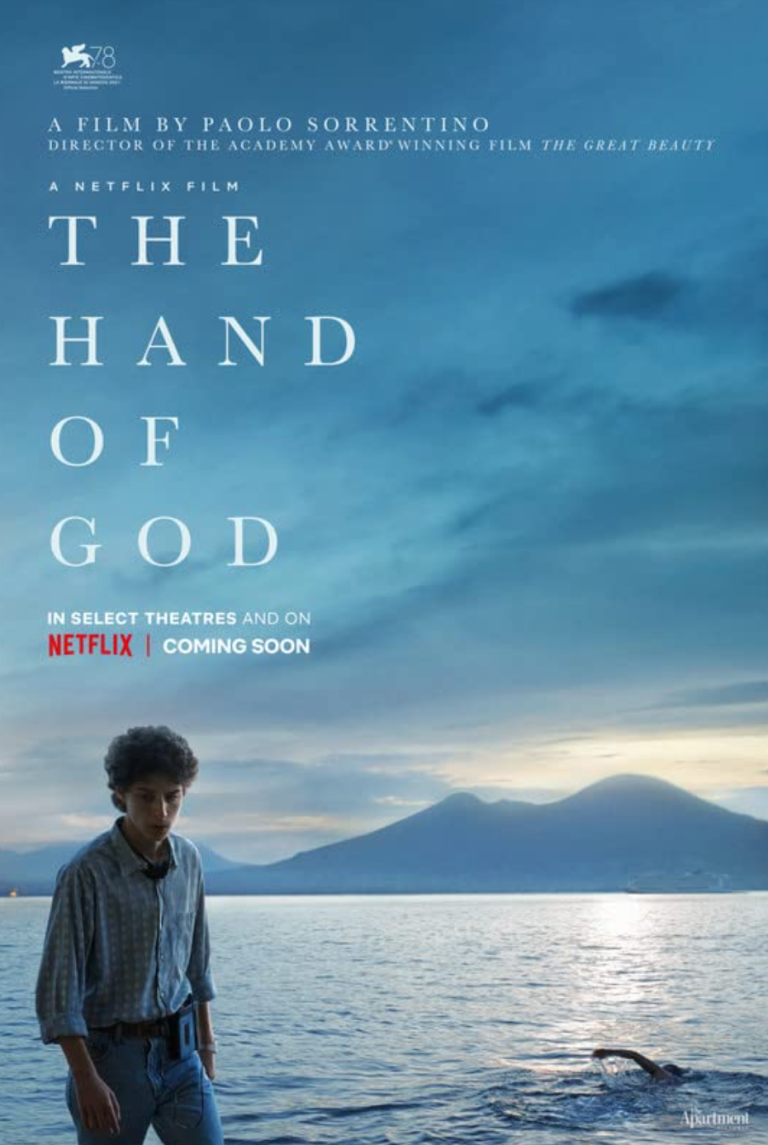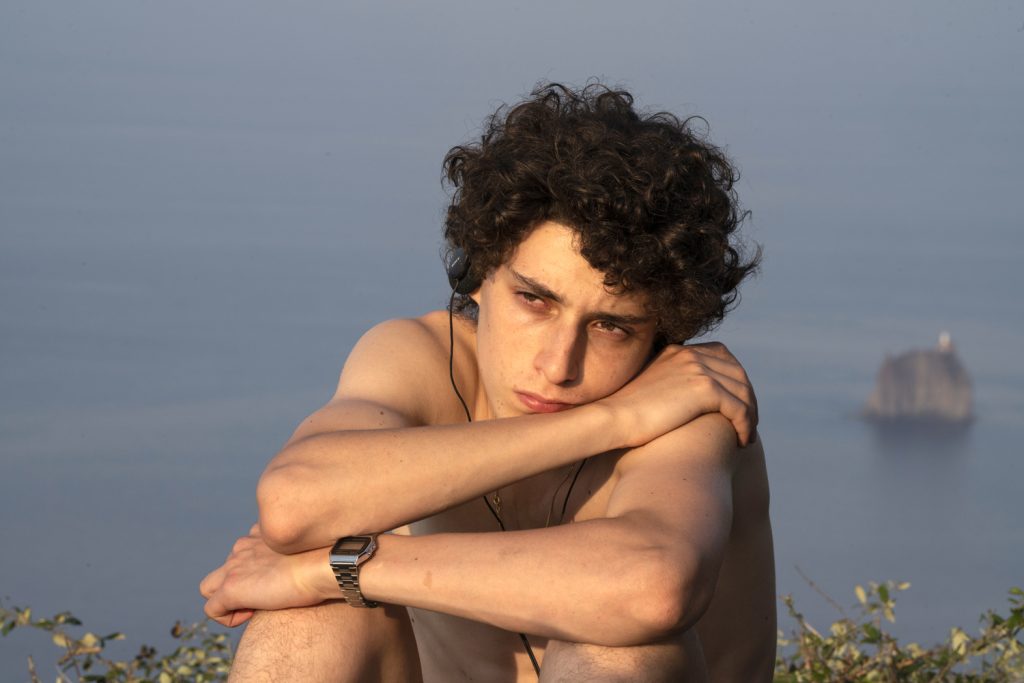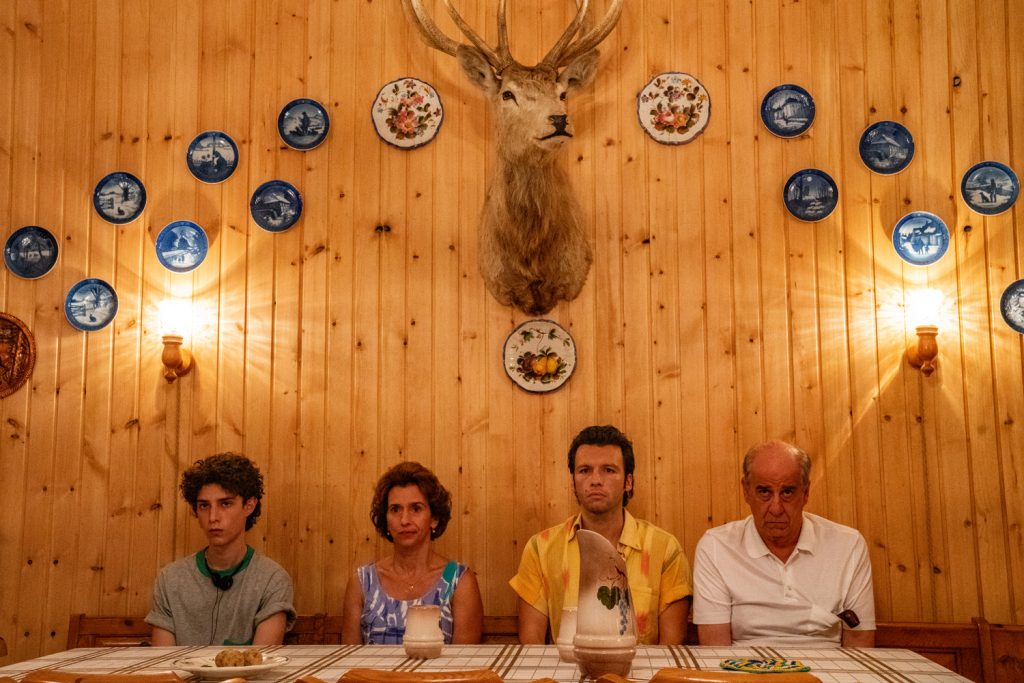
The most intimate and autobiographical film of Neapolitan director, Paolo Sorrentino, will be available on Netflix from December 15th. The Hand of God (È stata la mano di Dio) is a tender love letter to cinema, Naples and most importantly Maradona — who was the Manus Dei that saved the filmmaker’s life, as he chronicles in this awe-inspiring picture.
The film, that won the Silver Lion Grand Jury Prize at the Venice Film Festival and bestowed to Filippo Scotti the Marcello Mastroianni Award, was chosen to represent Italy at the 2022 Oscars.
In The Hand of God, Filippo Scotti plays Fabietto Schisa, an awkward Italian teen whose life and eccentric family are suddenly upended. He is Paolo Sorrentino’s alter ego, through a touching journey back to his childhood. The only poetic licenses taken by Sorrentino are his customary moments of visionary surrealism that make the dream factory so uplifting, but the actual narrative comes across as a therapeutic self-analysis of the day that changed his life forever.

It was in 1987 that 17-year-old Sorrentino, in order to attend a football match of his beloved Napoli and admire El Pibe de Oro in action, did not join his parents, like every other weekend, to the mountains. It was in the Roccaraso holiday family house, that the couple was killed by a leak of carbon monoxide, leaving the director-to-be and his siblings orphans.
Before the tragedy, The Hand of God shows the Felliniesque energy of the household members. The father (Toni Servillo) is full of spirit and idealism, although it turns out he has a historical colleague as a lover. The mother (Teresa Saponangelo) is a jubilant woman who enjoys playing pranks. His brother (Marlon Joubert) aspires to be an actor, whilst his sister (Rossella Di Lucca) is always locked up in the bathroom. There are also aunt Patrizia (Luisa Ranieri) who is a stupendously sexy, deranged exhibitionist, married to the jealous Franco (Massimiliano Gallo). Besides his circus-like family, Fabietto’s life is also affected by the interaction with the neighbours, such as the elderly Baroness Focale (Betti Pedrazzi), his smuggler friend Armando (Biagio Manna), and many others.
The tale of fate stages the Italian director’s adolescence amidst an epiphany of faces, voices and memories, between his inseparable walkman, the vespa rides along the Gulf of Naples, the Argentine champion’s goals, the imprecations of Neapolitan filmmaker Antonio Capuano and the VHS of Once upon a time in America. The cinematic Bildungsroman — that portrays a young disoriented man searching for moral values in society, who references Dante and dreams of working in cinema — intertwines scenes of joy and tragedy. The breathtaking Neapolitan Amarcord, blends folklore (with the legendary “Munaciello” sprite), dreamlike sequences (such as when Enzo De Caro in the role of San Gennaro picks up Fabietto’s aunt in a Rolls Royce), tributes to Federico Fellini (who is present only in voice) and Antonio Capuano (who acts as a Virgil to Fabietto’s hellish journey towards the heavenly realm of cinema).

With his latest oeuvre, Sorrentino does not look, but allows spectators to see him. The Oscar-winning director and screenwriter known for Il Divo, The Great Beauty, The Young Pope, bares his soul, showing all his humanity, without hiding any fragility. No wonder, the film begins with him quoting Diego Armando Maradona’s words: “I did what I could, I think I did not do so badly.”
The spirituality of this film is so potent that it seems to reverberate beyond the mundane. In fact, Paolo Sorrentino dedicated The Hand of God to his mother, to whom he wrote a letter in the Italian magazine D di Repubblica that reads:
Who knows if, in the afterlife, it is allowed to go to the cinema. So my mother could see the letter I wrote to her, through this film. The letter that lingers every day in the souls of grown-up children. Where we write, with the thoughts and words that we have not said, that wonder what was or was not, but which will always remain in our love life, the idea of the wonderful.
We had wonderful mothers and we didn’t know that as kids. They cultivated shaky pedagogies, hungry for guilt. My mother, for example, in moments of conflict, used to say: “When I’m gone, you will suffer a lot.” We didn’t want to believe it, because we rejected the concept of disappearance. Instead, of course, we did. How could it be otherwise. It was a glimpse of gratuitous and bona fide malice. On the other hand, wickedness tends to always be free. But it was another world.
My mother was quick but very loving. Irony was the relief for any problem. At the first symptoms of adolescence, when one began to frequent, with that crushed gravity, depth, my mother used an irritating tool: she minimised. As an adult, I understood. It seemed to me the only way. Minimise. It is not useful, but it is difficult to track down others. Today, the education of children is a mission. For my mother’s generation it was just another burden that life imposed. Still, it was all about love. But I figured it out later. And when I had the words to tell her, she was gone.
This is why I like to think, with the ingenuity of a deep child, that you can see a movie in the afterlife. To say what I could not say. And for those who can, I have only one advice: say it. At the cost of being ridiculous, sentimental and full of tears. It is necessary, in order to grow up, to pass through the doors of ridicule and tears. The crying of adults. The only way for a mother to find, in front of her, the wonderful child that we have all been.
Final Grade: A+

